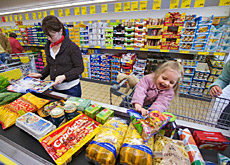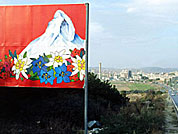Prices for EU goods could drop in July
Prices for European Union goods imported into Switzerland could begin to drop as of July after the government agreed to lower technical trade barriers on Wednesday.
Swiss ministers in Bern decided to implement the Cassis de Dijon principle, an agreement that says products legally made in the EU can be freely sold in other EU markets, as long as there is no public health risk.
Switzerland, which is not an EU member but has numerous agreements with the bloc, generally sells goods for higher prices than its EU neighbours do, largely because of a sluggish domestic market, lack of competition and stringent import rules.
That could change as the market opens to more competition, particularly with cosmetics, textiles, clothing, food and furniture covered by the principle.
The government originally adopted the Cassis de Dijon principle in 2005.Parliament approved it in 2009, and discussions have continued to iron out differences.
Under current Swiss rules, many EU products do not make their way to the Swiss market because of technical trade barriers. One famous example concerns German cream, which was not allowed to be sold in Switzerland because it was labelled with the German word “Sahne” rather than “Rahm”, the word preferred in German-speaking Switzerland.
In fact, about 48 per cent of goods imported from the EU currently face no technical hurdles. The agreement should boost that to about 80 per cent, with a possible saving of more than SFr2 billion ($1.7 billion) a year, the State Secretariat for Economics (Seco) has found.
The Cassis de Dijon principle originally came about in 1979 after a French importer sued in the European Court of Justice for being barred from selling a black currant liqueur, called Cassis de Dijon, in Germany because it contained less alcohol than German laws required.
swissinfo.ch and agencies

In compliance with the JTI standards
More: SWI swissinfo.ch certified by the Journalism Trust Initiative




You can find an overview of ongoing debates with our journalists here. Please join us!
If you want to start a conversation about a topic raised in this article or want to report factual errors, email us at english@swissinfo.ch.